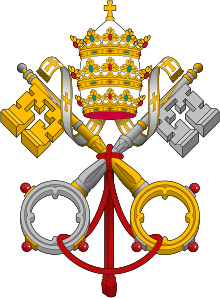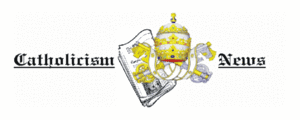Introduction The Catholic Church, also known as the Roman Catholic Church, is the largest Christian church, with 1.378 billion baptized Catholics worldwide It is among the world's oldest and largest international institutions, and has played a prominent role in the history and development of Western civilization. The church consists of 24 sui iuris churches, including the Latin Church and 23 Eastern Catholic Churches, which comprise almost 3,500 dioceses and eparchies located around the world. The pope, who is the bishop of Rome, is the chief pastor of the church. The Diocese of Rome, known as the Holy See, is the central governing authority of the church. The administrative body of the Holy See, the Roman Curia, has its principal offices in Vatican City, a small independent city-state and enclave within the Italian capital city of Rome, of which the pope is head of state. The core beliefs of Catholicism are found in the Nicene Creed. The Catholic Church teaches that it is the one, holy, catholic and apostolic church founded by Jesus Christ in his Great Commission, that its bishops are the successors of Christ's apostles, and that the pope is the successor to Saint Peter, upon whom primacy was conferred by Jesus Christ. It maintains that it practises the original Christian faith taught by the apostles, preserving the faith infallibly through scripture and sacred tradition as authentically interpreted through the magisterium of the church. The Roman Rite and others of the Latin Church, the Eastern Catholic liturgies, and institutes such as mendicant orders, enclosed monastic orders and third orders reflect a variety of theological and spiritual emphases in the church. Of its seven sacraments, the Eucharist is the principal one, celebrated liturgically in the Mass. The church teaches that through consecration by a priest, the sacrificial bread and wine become the body and blood of Christ. The Virgin Mary is venerated as the Perpetual Virgin, Mother of God, and Queen of Heaven; she is honoured in dogmas and devotions. Catholic social teaching emphasizes voluntary support for the sick, the poor, and the afflicted through the corporal and spiritual works of mercy. The Catholic Church operates tens of thousands of Catholic schools, universities and colleges, hospitals, and orphanages around the world, and is the largest non-government provider of education and health care in the world. Among its other social services are numerous charitable and humanitarian organizations. (Full article...) Selected article
 The Poor Fellow-Soldiers of Christ and of the Temple of Solomon (Latin: Pauperes commilitones Christi Templique Solomonici), commonly known as the Knights Templar or the Order of the Temple (French: Ordre du Temple or Templiers), were among the most famous of the Western Christian military orders. The organization existed for approximately two centuries in the Middle Ages. It was founded in the aftermath of the First Crusade of 1096, to ensure the safety of the many Europeans who made the pilgrimage to Jerusalem after its conquest.
Officially endorsed by the Roman Catholic Church in 1129, the Order became a favored charity across Europe and grew rapidly in membership and power. Templar knights in their distinctive white mantles with red cross were among the best fighting units of the Crusades. Non-combatant members of the Order managed a large economic infrastructure throughout Christendom, inventing or adapting many financial techniques that were an early form of banking, and building many fortifications across Europe and the Holy Land.
Selected image
 Credit: Eadfrith, Bishop of Lindisfarne
The incipit of the Gospel of Matthew from the Lindisfarne Gospels, an illuminated Latin manuscript of the gospels of Matthew, Mark, Luke and John. The manuscript was produced in Lindisfarne in Northumbria in the late 7th century or early 8th century, and is generally regarded as the finest example of the kingdom's unique style of religious art. It is currently in the collection of the British Library. Selected biography
 Bede (/biːd/; c. 672 or 673 – May 25, 735), also Saint Bede, the Venerable Bede, or (from Latin and Old English) Beda (Old English pronunciation: [ˈbeːdɑ]), was a Benedictine monk at the Northumbrian monastery of Saint Peter at Monkwearmouth, today part of Sunderland, and of its companion monastery, Saint Paul's, in modern Jarrow (see Wearmouth-Jarrow), both Northumbria. He is well known as an author and scholar, and his most famous work, Historia ecclesiastica gentis Anglorum (The Ecclesiastical History of the English People) gained him the title "The father of English history". Bede became known as Venerable Bede (Lat.: Beda Venerabilis) soon after his death, but this was not linked to consideration for sainthood by the Roman Catholic Church. In fact, his title is believed to come from a mistranslation of the Latin inscription on his tomb in Durham Cathedral, intended to be Here lie the venerable bones of Bede, but wrongly interpreted as here lie the bones of the Venerable Bede.
Did you know...
Related portalsFeast Day of April 26
Selected quote
News
SubcategoriesTopics
The Holy Bible:
Particular Churches (grouped by liturgical rite):
Things you can do
External resourcesWikiProjectsAssociated WikimediaThe following Wikimedia Foundation sister projects provide more on this subject:
Discover Wikipedia using portals |
































